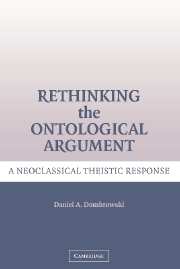Book contents
- Frontmatter
- Contents
- Acknowledgments
- Introduction
- 1 Historical Background
- 2 Poetry versus the Ontological Argument: Richard Rorty's Challenge
- 3 Deconstructionism and the Ontological Argument: The Case of Mark Taylor
- 4 Is the Ontological Argument Worthless? Graham Oppy's Rejection
- 5 Oppy, Perfect Islands, and Existence as a Predicate
- 6 Rival Concepts of God and the Ontological Argument: Thomas Morris, Katherin Rogers, and Alvin Plantinga
- Bibliography
- Index
4 - Is the Ontological Argument Worthless? Graham Oppy's Rejection
Published online by Cambridge University Press: 16 July 2009
- Frontmatter
- Contents
- Acknowledgments
- Introduction
- 1 Historical Background
- 2 Poetry versus the Ontological Argument: Richard Rorty's Challenge
- 3 Deconstructionism and the Ontological Argument: The Case of Mark Taylor
- 4 Is the Ontological Argument Worthless? Graham Oppy's Rejection
- 5 Oppy, Perfect Islands, and Existence as a Predicate
- 6 Rival Concepts of God and the Ontological Argument: Thomas Morris, Katherin Rogers, and Alvin Plantinga
- Bibliography
- Index
Summary
Epistemological Conservativism
In order to orient ourselves with respect to Graham Oppy's encyclopedic and scholarly study of the ontological argument, it will be helpful to point out conflicting evidence in his book regarding two key issues. The first concerns the extent to which, and the ways in which, Oppy rejects the argument. In this regard it is important to emphasize that he remains throughout an agnostic, rather than an atheist. And the second concerns a key premise in the ontological argument that alleges that we can, in fact, have a clear enough concept of the greatest conceivable being to get the argument started.
Oppy starts from an epistemological assumption that he shares with some religious believers. This is the tenet that is crucial to reformed epistemology, that philosophical views should be presumed innocent until convicted. This gives elbow room for theists, atheists, and agnostics alike to hold their respective views. Like Oppy, it is probable that each one of us has friends in each of these camps and it would be obnoxious to claim that everyone outside of one's own camp is irrational. The initial solace provided to the defender of the ontological argument by this stance is erased, however, when Oppy claims that there is nothing in the ontological argument that could bring a reasonable agnostic around to an acceptance of this argument (Oppy 1995, xiii, 330).
- Type
- Chapter
- Information
- Rethinking the Ontological ArgumentA Neoclassical Theistic Response, pp. 84 - 109Publisher: Cambridge University PressPrint publication year: 2006



